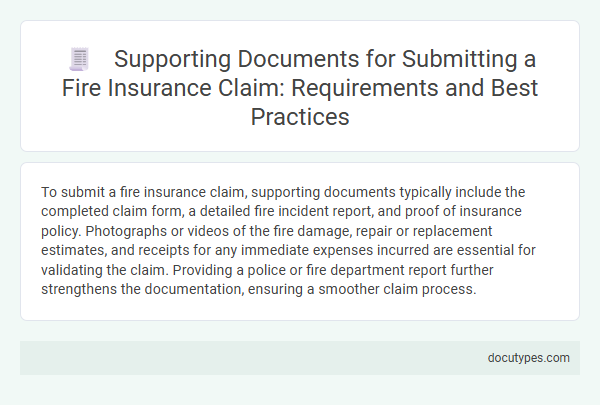To submit a fire insurance claim, supporting documents typically include the completed claim form, a detailed fire incident report, and proof of insurance policy. Photographs or videos of the fire damage, repair or replacement estimates, and receipts for any immediate expenses incurred are essential for validating the claim. Providing a police or fire department report further strengthens the documentation, ensuring a smoother claim process.
Introduction to Fire Insurance Claim Documentation
| Introduction to Fire Insurance Claim Documentation | |
|---|---|
| Definition | Fire insurance claim documentation refers to the collection of evidence and official papers required to process a claim after fire damage. |
| Purpose | These documents help verify the incident, assess the losses, and facilitate timely claim settlement. |
| Importance | Complete and accurate documentation ensures smooth communication with the insurance provider and avoids claim rejection. |
| Primary Documents | Fire insurance policy, claim form, fire department report, incident photographs, property ownership proof, repair estimates, and identity proof. |
| Role of the Claimant | You must gather and submit all necessary supporting documents promptly to validate your claim and enable efficient processing. |
Importance of Proper Supporting Documents
Supporting documents for submitting a fire insurance claim include a detailed fire incident report, photographs of the damaged property, and a comprehensive inventory of lost or damaged items. Proper documentation is crucial to validate the claim and ensure timely processing by the insurance company. Your accurate and complete evidence helps prevent claim denials and supports a fair settlement.
Essential Documents Required for Fire Insurance Claims
Essential documents required for submitting a fire insurance claim include the original insurance policy, a detailed fire incident report, and proof of loss or damage. Policyholders must also provide photographs or videos of the affected property and a list of damaged items with their approximate values. Receipts, repair estimates, and any communication with fire department officials further support the claim process.
Proof of Ownership and Inventory Records
Submitting a fire insurance claim requires specific supporting documents to ensure a smooth and successful process. Two critical documents are proof of ownership and detailed inventory records.
Proof of ownership establishes your legal right to the damaged property, which can include purchase receipts, titles, or registration documents. Inventory records provide a complete list of lost or damaged items, often accompanied by photos or appraisals to verify their value.
Fire Incident and Police Reports
Submitting a fire insurance claim requires specific supporting documents to validate the incident and facilitate the processing. Fire incident and police reports provide critical evidence of the fire event and its circumstances.
- Fire Incident Report - This document details the cause, extent, and response to the fire, serving as official proof of the incident.
- Police Report - Provides an authoritative account of the event, including any investigation findings related to the fire's origin and suspicious activity.
- Claim Verification - Both reports aid the insurer in verifying the legitimacy of the claim, ensuring accurate assessment and timely settlement.
Photographic Evidence and Damage Assessments
Photographic evidence plays a crucial role in supporting a fire insurance claim by visually documenting the extent of the damage. Clear, time-stamped photos of affected areas help validate the claim and speed up the settlement process.
Damage assessments conducted by certified professionals provide an accurate evaluation of the loss incurred. These reports detail structural damages, content loss, and repair estimates, serving as essential proof for insurers. Submitting both photographic evidence and detailed damage assessments ensures a comprehensive claim submission.
Repair and Replacement Cost Estimates
Repair and replacement cost estimates are crucial supporting documents when submitting a fire insurance claim. These estimates provide a detailed breakdown of the expenses required to restore or replace damaged property.
Insurance companies rely on accurate cost assessments to process claims efficiently and ensure fair compensation. You should obtain these estimates from licensed contractors or certified professionals to validate the claim's financial requirements.
Claim Form Submission Guidelines
Submitting a fire insurance claim requires precise documentation to ensure a smooth process. Understanding the claim form submission guidelines is essential for timely approval and settlement.
- Accurate Claim Form Completion - Provide all required information clearly to avoid delays in processing the fire insurance claim.
- Supporting Documentation Attachment - Include relevant documents such as fire incident reports, property damage assessments, and proof of ownership with the claim form.
- Timely Submission - Submit the completed claim form and supporting documents within the insurer's specified deadline to maintain claim validity.
Following these submission guidelines increases the likelihood of a successful fire insurance claim resolution.
Common Mistakes to Avoid in Document Preparation
What are the key supporting documents required for submitting a fire insurance claim? Essential documents include the insurance policy, fire incident report, and proof of loss. Properly gathering these ensures a smooth claim process.
What common mistakes should be avoided when preparing documents for a fire insurance claim? Incomplete or inaccurate information can delay claim approval. Avoid submitting unsigned forms and unclear photos to prevent unnecessary setbacks.
What Are the Supporting Documents for Submitting a Fire Insurance Claim? Infographic

